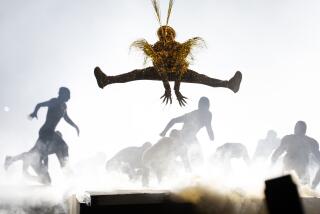Albertville Bids Adieu to Its Winter Games
- Share via
ALBERTVILLE, France — A Winter Olympics that opened amid a solemn and surreal ceremony 17 days ago closed Sunday with Canadian athletes doing back flips, a Dutch speed skater running into the stands with gifts, fireworks and an angel gliding down a wire to douse the Olympic flame.
The angel was serenaded by boos from fans who had seen the flame symbolize Albertville’s claim as capital of the winter sports world for more than a fortnight and who were reluctant to see the reign end for the town and the Savoy region of France.
“The Olympic torch will thus be put out. However, there is no doubt that a little ray resembling it will shine within us for a long time,” said Michael Barnier, one of the organizers of the Winter Games.
The Games that began with curiosity as to how the world’s changing political structure in the past four years would affect athletics ended with a message that the effect was not as great as expected.
The final gold medal was won in hockey by the Unified Team, just as seven of the previous nine Olympic hockey tournaments had been won by the Soviet Union.
“I was singing the old Soviet anthem to myself,” said Viacheslav Bykov, the captain and center whose slapshot provided the final goal of a 3-1 victory over Canada. “I was thinking the future is Russian.”
As he sang the old “Internationale” softly, the flag hoisted over the topmost staff, symbolic of the gold medal, was the familiar five-ringed banner of the Olympics, and the music accompanying the ceremony was the Olympic Theme.
The Unified Team was made up of Russia, Ukraine, Belarus, Kazakhstan and Uzbekistan--five of the former Soviet republics making up the Commonwealth of Independent States--and had no anthem of its own.
Other republics, the newly independent states of Latvia, Lithuania and Estonia and the breakaway Yugoslav republics of Croatia and Slovenia, demonstrated their independence by competing under their own names but won no medals.
“It’s not so important that you come home with medals,” said Tomo Leuounak, secretary of the Slovenian Olympic Committee. “It was important that our flag was shown.”
Two flags were replaced by one, with a combined team representing Germany and replacing that of the former East Germany and West Germany. It was a potent team, winning 26 medals, more than any other country--and 10 of them were gold.
The Unified Team was second on the medals list with 23, nine of them gold, followed by Austria, 21, and Norway, 20.
The United States finished with 11 medals, nine of them awarded to women, who provided all five of the U.S. gold-medal efforts.
They included Kristi Yamaguchi of Fremont, Calif., in figure skating; Bonnie Blair of Champaign, Ill., in 500-meter and 1,000-meter speedskating; Cathy Turner of Rochester, N.Y., in 500-meter short-track speedskating, and Donna Weinbrecht of West Milford, N.J., in moguls skiing.
The 11 medals were five more than the United States won in 1988 and one shy of the U.S. record set in 1932 and tied in 1980.
It was an Olympics of individual achievement and stars: Alberto Tomba of Italy arriving at the venue of Val d’Isere by helicopter, then becoming the first Alpine skier to successfully defend his Olympic crown by winning the giant slalom by day and proving himself a party-goer of Olympian proportions by night; Finn Christian Jagge of Norway beating Tomba in the Olympic slalom on the day’s last run; Tony Nieminen of Finland, at 16 years 259 days becoming the youngest male gold medalist in Winter Olympic history and at the same time becoming a pioneer when his V style carried him more than 400 feet in the ski jump, and Norway’s Bjorn Dahlie and Vegard Ulvang, each of whom won three gold medals and one silver in cross-country ski events.
In the closing ceremony, Albertville Mayor Henri Bujol passed on the Olympic flag to International Olympic Committee president Juan Antonio Samaranch. It will next fly over Lillehammer, Norway, in 1994, when the IOC separates the years of the Winter and Summer Games. Lillehammer promises an “environmental Olympics,” with fines of up to more than $8,000 for cutting down a tree to prepare a venue.
More to Read
Go beyond the scoreboard
Get the latest on L.A.'s teams in the daily Sports Report newsletter.
You may occasionally receive promotional content from the Los Angeles Times.






